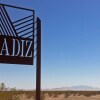Endgame: SB 120 and the Battle Over the Cadiz Project

With only days left in the legislative session, environmental groups are converging on Sacramento, contacting lawmakers to pass SB-120, a bill that would block Cadiz Inc. from pumping groundwater in the Mojave Desert and selling it to Southern California cities, via a 43-mile pipeline to the Colorado Aqueduct.
The Cadiz project has been one of the most controversial and hardest-fought environmental battles the desert has seen in a generation, pitting activists, experts and even celebrities against developers and the Trump Administration (which rolled back Obama-era rules in 2015 that would have forced a new review of the project).

Critics argue that the Cadiz project is environmentally irresponsible and that the cities and towns that receive the water would use it irresponsibly. Cadiz plans to build a water pipeline that runs through the Mojave Trails National Monument, pumping over 16 billion gallons of water annually. The project has been fraught on the political level, too. Democratic politicians in California, including Sen. Dianne Feinstein, Gov. Jerry Brown, L.A. Mayor Eric Garcetti and Lt. Gov. Gavin Newsom have all come out against Cadiz’s plans.
Read more about the Cadiz Project
Writing for KCET in May of 2017, Chris Clarke, an environmental writer and the California Desert Program Manager for the National Parks Conservation Association, summed up the Cadiz controversy this way:
“Will Cadiz be pumping this fossil water to end users in Southern California suburbs, or will the water Cadiz supplies have fallen in the Mojave sometime in the last couple thousand years? And either way, how long will our stingy modern rains take to replenish the 50,000 acre-feet per year Cadiz would sell?”
Environmental studies have not been positive surrounding the Cadiz project. According to the Mojave Desert Land Trust, a nonprofit conservation group located in Joshua Tree, the Cadiz project would greatly affect the springs that migratory birds, bighorn sheep and native desert plants all rely on to survive. The study found that Bonanza Spring, one of the Mojave springs that would be affected by Cadiz groundwater pumping, would not be replenished quickly enough by rainwater to be sustainable to wildlife. In an April 2018 study funded by the Mojave Desert Land Trust called “Understanding the Source of Water for Selected Springs Within Mojave Trails National Monument, California,” they stated that:
“Substantial groundwater development is proposed for export out of the region. Proposed groundwater development is anticipated to be in excess of the groundwater recharge to the basin, resulting in basin aquifer drawdown from pumping upgradient, and impacts to elevations above Bonanza Spring.”
SB 120, written by state Sen. Richard Roth, could finally stop the Cadiz project from going forward. For Roth, the issue is less about groundwater pumping, and more about whether the project is sustainable. The bill would prohibit projects that pump groundwater out of the desert, unless transfers are deemed to be safe and sustainable and do not adversely affect nearby state or federal lands. According to the text of the bill:
“[SB 120] will prohibit a transferor of water from using a water conveyance facility that has unused capacity to transfer water from a groundwater basin underlying desert lands, as defined, that is in the vicinity of specified federal lands or state lands to outside of the groundwater basin unless the State Lands Commission, in consultation with the Department of Fish and Wildlife, finds that the transfer of the water will not adversely affect the natural or cultural resources of those federal and state lands.”
Award-winning scientist, Peter Gleick, who specializes in water related issues, and Mary Martin, the former superintendent of the Mojave National Preserve, co-authored an op-ed arguing that the Cadiz project would harm the Mojave Desert:
“The Cadiz concept is simple: extract an average of 16 billion gallons per year for 50 years from a groundwater aquifer underneath protected national park and monument land for sale to Southern California for profit. The project is the very definition of “unsustainable” -- it would mine groundwater at a rate far faster than it is naturally recharged. Federal scientists at the U.S. Geological Survey (USGS) estimate Cadiz would remove water from the aquifer as much as 10 times faster than it fills up naturally. Without this aggressive pumping and short-term thinking, the math won’t add up for Cadiz’s hedge fund managers and other investors.”
Now, it’s the endgame. Will California legislators side with activists and environmental analysis or with business development and the Trump Administration?
Top Image: View of the Mojave Desert with cars | Public Domain














